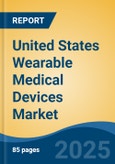Speak directly to the analyst to clarify any post sales queries you may have.
10% Free customizationThis report comes with 10% free customization, enabling you to add data that meets your specific business needs.
Key Market Drivers
Increasing Technological Advancements and Innovations
Continuous innovation and evolving technology are key drivers of demand for wearable medical devices in the U.S. market. Devices now offer real-time tracking of health metrics with impressive precision, ranging from fitness bands to advanced therapeutic devices such as insulin pumps and ECG monitors. The integration of IoT and artificial intelligence has significantly enhanced the analytical capabilities of these devices, allowing for predictive insights and seamless data sharing with healthcare providers. These innovations not only support early diagnosis but also promote preventive healthcare and remote patient management. The surge in telehealth adoption has further underscored the utility of wearables as a core component of digital health ecosystems, reinforcing their value in modern medical care.Key Market Challenges
High Cost of Wearable Devices
The premium pricing of wearable medical devices continues to be a significant barrier to broader adoption. The high cost results from advanced engineering, research and development, and the incorporation of cutting-edge features. While these devices provide meaningful health benefits, many consumers - especially those in lower and middle-income brackets - struggle to justify or afford the expense. Moreover, limited insurance coverage for wearables often places the financial responsibility solely on consumers. The perception of these devices as luxury rather than essential healthcare tools hinders market penetration, emphasizing the need for cost optimization strategies by manufacturers to make wearables more accessible.Key Market Trends
Rising Demand of Telemedicine
Telemedicine’s growing footprint in the U.S. healthcare system is significantly boosting demand for wearable medical devices. These devices play an instrumental role in enabling remote patient monitoring, a core element of telehealth services. Particularly in rural or underserved areas, wearables allow physicians to remotely monitor patient vitals, leading to faster interventions and reduced hospital admissions. Devices such as blood pressure monitors, glucose sensors, and heart rate trackers are increasingly used in conjunction with telemedicine platforms to provide continuous, real-time health data. This trend aligns with the healthcare sector’s broader push toward decentralized and patient-centric care, reinforcing the role of wearables in future healthcare delivery models.Key Market Players
- Abbott Laboratories, Inc.
- Fitbit, Inc.
- Apple, Inc.
- GE Healthcare
- Masimo Corporation
- Dexcom Inc.
- Biotelemetry Inc.
- iRhythm Technologies, Inc.
- Preventice Solutions, Inc.
- Medtronic plc
Report Scope:
In this report, the United States Wearable Medical Devices Market has been segmented into the following categories, in addition to the industry trends which have also been detailed below:United States Wearable Medical Devices Market, By Type:
- Vital Signs Monitoring Devices
- Therapeutic Devices
United States Wearable Medical Devices Market, By Product Type:
- Activity Monitors/Trackers
- Smartwatches
- Patches
- Smart Clothing
United States Wearable Medical Devices Market, By Purpose:
- Heart Rate
- Blood Pressure
- Body Temperature
- Blood Oxygen Saturation
- Posture
- Physical Activities
- Hearing Aids
- Others
United States Wearable Medical Devices Market, By Site:
- Handheld
- Headband
- Strap/Clip/Bracelet
- Shoe Sensors
- Others
United States Wearable Medical Devices Market, By Application:
- General Health & Fitness
- Remote Patient Monitoring
- Home Healthcare
United States Wearable Medical Devices Market, By Distribution Channel:
- Store-Based
- Non-Store-Based
United States Wearable Medical Devices Market, By Region:
- Northeast Region
- Midwest Region
- West Region
- South Region
Competitive Landscape
Company Profiles: Detailed analysis of the major companies present in the United States Wearable Medical Devices Market.Available Customizations:
With the given market data, the publisher offers customizations according to a company's specific needs. The following customization options are available for the report.Company Information
- Detailed analysis and profiling of additional market players (up to five).
This product will be delivered within 1-3 business days.
Table of Contents
Companies Mentioned
- Abbott Laboratories, Inc.
- Fitbit, Inc.
- Apple, Inc.
- GE Healthcare
- Masimo Corporation
- Dexcom Inc.
- Biotelemetry Inc.
- iRhythm Technologies, Inc.
- Preventice Solutions, Inc.
- Medtronic plc
Table Information
| Report Attribute | Details |
|---|---|
| No. of Pages | 85 |
| Published | July 2025 |
| Forecast Period | 2024 - 2030 |
| Estimated Market Value ( USD | $ 4.44 Billion |
| Forecasted Market Value ( USD | $ 12.6 Billion |
| Compound Annual Growth Rate | 19.1% |
| Regions Covered | United States |
| No. of Companies Mentioned | 10 |









